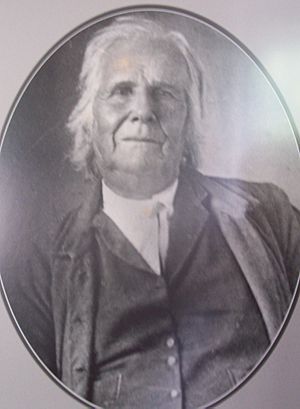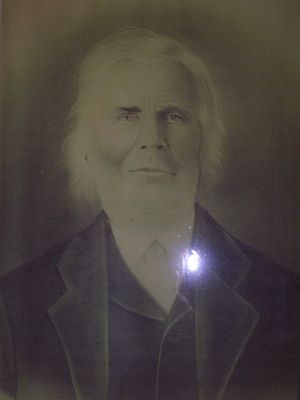Dennis Pennington facts for kids
Quick facts for kids
Dennis Pennington
|
|
|---|---|

Photo of Dennis Pennington on display in the Indiana First State Capitol Building
|
|
| Indiana Territorial Legislature speaker |
|
| In office 1810–1816 |
|
| Preceded by | None |
| Succeeded by | None |
| Constituency | Harrison County |
| Indiana State Senate Speaker (1816–18) |
|
| In office 1816–1820 |
|
| In office 1825–1827 |
|
| In office 1830–1833 |
|
| In office 1842–1845 |
|
| Constituency | Harrison County |
| Indiana House of Representatives | |
| In office 1822–1824 |
|
| In office 1828–1830 |
|
| In office 1845–1846 |
|
| Constituency | Harrison County |
| Personal details | |
| Born | May 18, 1776 Cumberland County, Virginia |
| Died | September 2, 1854 (aged 78) Harrison County, Indiana |
| Political party | Whig Party |
| Spouse | Elizabeth English |
| Relations | Walter Q. Gresham (grandnephew) |
| Residence | Central Barren, Indiana |
| Occupation | Farmer, stonemason, politician |
| Nicknames | "Old Uncle Dennis", "Father Pennington" |
Dennis Pennington (born May 18, 1776 – died September 2, 1854) was an important early leader in Indiana. He was a farmer and a stonemason who spent many years in public service. He helped shape Indiana's government, first in the Indiana Territory and later in the state's General Assembly.
Pennington was a member of the Whig Party. He became the first speaker of the Indiana territorial legislature's lower house in 1810. He also helped count the population in 1815. Later, he was one of the delegates who wrote Indiana's first state constitution in 1816.
He was the first speaker of the Indiana Senate from 1816 to 1818. He served in the state legislature for eighteen years in total. His biggest contribution was strongly opposing slavery. People knew him for his common sense and strong character. He was often called "Old Uncle Dennis" or "Father Pennington."
Contents
Early Life and Moving West
Dennis Pennington was born in Cumberland County, Virginia, on May 18, 1776. This was just before the American Revolution. He didn't go to school much, but he learned a lot from his life experiences.
In 1797, Pennington moved west to Kentucky. He traveled with Henry Clay, who was against slavery. Pennington became friends with Clay and supported his efforts to make Kentucky a free state.
Family Life
Pennington married Elizabeth English in Kentucky on August 4, 1800. Elizabeth had been captured by Native Americans when she was four years old. She was returned to her family when she was thirteen.
Starting a Career in Indiana
Between 1801 and 1804, Pennington moved across the Ohio River into the Northwest Territory. He settled in Harrison County around 1802. He bought land near Lanesville, Indiana, built a home, and started a farm.
Around 1804, he explored the area that became Corydon, Indiana, and built a cabin there. In 1815, Pennington moved to Central Barren, Indiana, about 4 miles (6.4 km) north of Corydon. He and his brother, Walter, built a church there called Pennington Chapel.
Political Journey and Fighting Slavery
Pennington was a farmer and stonemason, but he also became very active in politics. He was a member of the Whig Party and worked hard against slavery.
He met William Henry Harrison, who became the governor of the Indiana Territory in 1801. At first, Pennington supported Harrison. However, he changed his mind when Harrison started policies that supported slavery in the territory.
In 1802, Harrison asked the U.S. Congress to allow slavery in the territory for ten years. Congress said no. But Harrison and his supporters still tried to allow a form of slavery called indentured servitude.
Standing Up Against Slavery
Pennington became a justice of the peace for Harrison County in 1807. He openly spoke out against Governor Harrison and the pro-slavery government. On October 10, 1807, he gave a speech in Clark County where he strongly condemned slavery. People at the meeting agreed to work to end slavery in the territory.
In 1809, the U.S. Congress changed the rules for the Indiana Territory. This allowed citizens to elect representatives to their legislature, which reduced the governor's power.
Becoming a Territorial Legislator
On April 2, 1810, Pennington was elected to represent Harrison County in the territorial legislature. Many other anti-slavery leaders were also elected. Pennington became the first speaker of the lower house. He helped pass laws to get rid of the slavery and indentured servitude rules that Harrison had put in place.
Moving the Capital to Corydon
During the War of 1812, Pennington suggested moving the capital from Vincennes. He said it was too dangerous because of threats from Native Americans. Corydon, Pennington's hometown, was one of the towns hoping to become the new capital.
Pennington helped make sure Corydon was chosen. He pointed out its good location. He also got the job to oversee the building of a new courthouse in Corydon. This building would also serve as the territorial legislature's meeting place. Construction started in 1814. It cost about $3,000 and was almost finished when Indiana became a state in 1816. This building became Indiana's first state capitol building from 1816 to 1825.
In 1815, Pennington worked as the census taker for the Indiana Territory. He used this job to talk to people about his anti-slavery ideas. This helped prepare for the election of anti-slavery delegates to the constitutional convention. He wanted to make sure slavery would not be part of Indiana's state constitution.
In 1815, Pennington and other leaders asked the U.S. Congress for permission to hold a convention to discuss becoming a state. President James Madison approved this request in 1816.
Helping Write Indiana's Constitution
In May 1816, Pennington was chosen as one of Harrison County's five delegates for Indiana's first constitutional convention. This meeting took place in Corydon from June 10 to 29, 1816. The delegates discussed statehood and wrote Indiana's first state constitution.
Pennington worked with Jonathan Jennings and other anti-slavery delegates. They succeeded in adding a rule to the constitution that banned slavery in Indiana forever. This rule said that slavery could never be introduced into the state.
The anti-slavery group also hoped that becoming a state would allow Indiana citizens to elect their own governor. This would prevent future governors from supporting slavery.
Serving in the State Legislature
After Indiana became a state in 1816, Pennington was elected to the Indiana Senate. He served as its first speaker from 1816 to 1818. He continued to speak out against slavery and was a strong Whig.
Pennington served a total of eighteen years in the Indiana General Assembly. This included thirteen years in the Indiana Senate and five years in the Indiana House of Representatives.
In 1818, Pennington helped bring charges against three men from Kentucky. They had forcibly taken a black woman from a home in Indiana and brought her to Kentucky. This was against Indiana's "man stealing act." The governor of Kentucky refused to send the men back to Indiana for trial.
In 1825, Pennington ran for Lieutenant Governor of Indiana but lost. During his campaign, he spoke out against the state's big plan for building roads and canals, especially the Wabash and Erie Canal. He believed these projects would not help his area and would make the state go broke. He also thought that railroads would soon make canals old-fashioned.
His predictions were mostly right. The huge system of roads, canals, and railroads was never fully finished. The projects caused the state government to go bankrupt.
Pennington continued to serve in the Indiana General Assembly until 1846. He was one of the oldest members and was lovingly called "Old Uncle Dennis" and "Father Pennington."
Later Years and Legacy
Pennington stayed active in public life even in his later years. He became a trustee for Indiana University. In 1850, he again helped count the population for Harrison County.
When he was about sixty years old, he became the sheriff of Harrison County. He won a second term by challenging his younger opponent to a wrestling match, which the opponent declined.
Dennis Pennington died at his home in Harrison County on September 2, 1854, at age seventy-eight. He was buried in Pennington Chapel Cemetery.
Pennington is remembered for being honest, having common sense, and being kind. He was a respected leader in Indiana politics for almost thirty years. He is best known for fighting against slavery and for his many years of public service.
His most lasting legacy is the Old Capitol building in Corydon, Indiana. He oversaw its construction. This building is now part of the Corydon Capital State Historic Site.
Honors and Tributes
The Kintner House Inn, a bed and breakfast in Corydon, Indiana, has a guest room named after Dennis Pennington. This honors him as one of Harrison County's most important citizens.
See also
- Corydon Historic District
- History of slavery in Indiana
 | John T. Biggers |
 | Thomas Blackshear |
 | Mark Bradford |
 | Beverly Buchanan |


